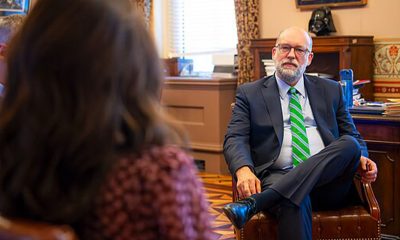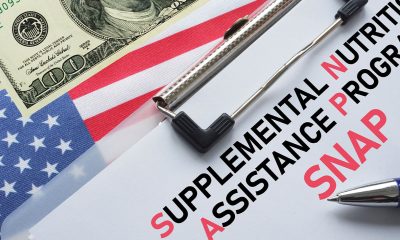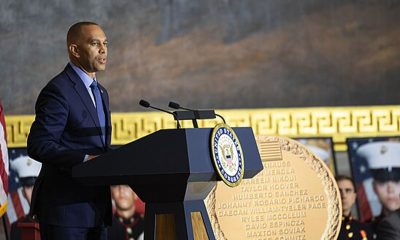Bay Area
Marin: Proposed Budget Heads to Supervisors Public hearings on County expenses and priorities scheduled for June 20-22
The proposed budget for 2023-24 is balanced and structurally sound. It maintains current services and makes a few high priority ongoing enhancements to address emerging needs. Most significantly, the proposed budget recommends $49.8 million in one-time allocations funded by $24.4 million from projected current year fund balance and $25.4 million from previously established reserves, special revenue funds, and federal COVID-19 relief funding.

San Rafael, CA – Economic uncertainties linger, but the County Administrator’s Office will present a balanced budget to the Marin County Board of Supervisors at the public hearings on June 20-22.
The proposed budget for 2023-24 is balanced and structurally sound. It maintains current services and makes a few high priority ongoing enhancements to address emerging needs. Most significantly, the proposed budget recommends $49.8 million in one-time allocations funded by $24.4 million from projected current year fund balance and $25.4 million from previously established reserves, special revenue funds, and federal COVID-19 relief funding.
Highlights of significant one-time budget enhancements include:
- Civic Center/Veterans’ Memorial Auditorium modernization program ($30 million)
- Employee retention incentives ($5 million)
- Homeless encampment partnership funds ($2.5 million)
- Enhanced summer road improvement program ($2 million)
- Creation of a workforce housing reserve ($2 million)
- Increase state/federal uncertainty reserve ($1.2 million)
Compared to last year’s budget, the total County proposed budget of $784 million is an increase of 9% and the General Fund budget of $594 million is an increase of 6%.
Three days of informational budget planning sessions were held in March to help inform a proposed budget that reflects the following top priorities:
- building a racially equitable community
- investing in County infrastructure
- preserving and increasing affordable housing choices and addressing homelessness
- addressing County workforce recruitment and retention
- reducing carbon emissions and adapting to climate change
- enhancing disaster preparedness
Budget Director Josh Swedberg said proposed budget for 2023-24 maintains vital County services. “The slowing economy limits our ability to make new ongoing budget enhancements,” he said. “However, the proposed budget makes significant one-time investments while preparing for future uncertainty.”
An additional $3.2 million in new ongoing funding is earmarked for high-priority needs, including implementation of a Sheriff’s Office oversight board as per State Assembly Bill 1185. The proposed budget also provides an increase to the living wage for eligible County workers to $18 per hour, adds job retention incentives for County employees, enhances services to older people, and increases the annual contribution to the capital improvement program by $1 million.
The largest sources of revenue in the budget are taxes (42%) and the state and federal governments (35%). The largest expenditures are for the County workforce’s salaries and benefits (56%) and public services and supplies (35%). Roughly 70% of the County budget is for mandated programs such as public health, public safety, and justice-related services.
The June 20-22 hearings will be aired live and later archived on the County website. The Tuesday session begins at 1:30 p.m. and will feature public comment. Those interested in contributing comments may join online or in the Board chamber at Suite 330, Marin County Civic Center, 3501 Civic Center Drive, San Rafael. The hearings continue at 9 a.m. Wednesday, and the final Thursday session starts at 1:30 p.m. A detailed hearings schedule will be uploaded to the Board’s webpage on June 15.
All public meetings and events sponsored or conducted by the County of Marin are held at accessible sites. If you are a person with a disability and require information or materials in alternative formats – or if you require accommodation to participate in a county program, service or activity – please contact department staff by email or at (415) 473-7331 or (415) 473-4381 (voice/TTY).
Alameda County
Seth Curry Makes Impressive Debut with the Golden State Warriors
Seth looked comfortable in his new uniform, seamlessly fitting into the Warriors’ offensive and defensive system. He finished the night with an impressive 14 points, becoming one of the team’s top scorers for the game. Seth’s points came in a variety of ways – floaters, spot-up three-pointers, mid-range jumpers, and a handful of aggressive drives that kept the Oklahoma City Thunder defense on its heels.

By Y’Anad Burrell
Tuesday night was anything but ordinary for fans in San Francisco as Seth Curry made his highly anticipated debut as a new member of the Golden State Warriors. Seth didn’t disappoint, delivering a performance that not only showcased his scoring ability but also demonstrated his added value to the team.
At 35, the 12-year NBA veteran on Monday signed a contract to play with the Warriors for the rest of the season.
Seth looked comfortable in his new uniform, seamlessly fitting into the Warriors’ offensive and defensive system. He finished the night with an impressive 14 points, becoming one of the team’s top scorers for the game. Seth’s points came in a variety of ways – floaters, spot-up three-pointers, mid-range jumpers, and a handful of aggressive drives that kept the Oklahoma City Thunder defense on its heels.
One of the most memorable moments of the evening came before Seth even scored his first points. As he checked into the game, the Chase Center erupted into applause, with fans rising to their feet to give the newest Warrior a standing ovation.
The crowd’s reaction was a testament not only to Seth’s reputation as a sharpshooter but also to the excitement he brings to the Warriors. It was clear that fans quickly embraced Seth as one of their own, eager to see what he could bring to the team’s championship aspirations.
Warriors’ superstar Steph Curry – Seth’s brother – did not play due to an injury. One could only imagine what it would be like if the Curry brothers were on the court together. Magic in the making.
Seth’s debut proved to be a turning point for the Warriors. Not only did he contribute on the scoreboard, but he also brought a sense of confidence and composure to the floor.
While their loss last night, OKC 124 – GSW 112, Seth’s impact was a game-changer and there’s more yet to come. Beyond statistics, it was clear that Seth’s presence elevated the team’s performance, giving the Warriors a new force as they look to make a deep playoff run.
Activism
Oakland Post: Week of November 26 – December 2, 2025
The printed Weekly Edition of the Oakland Post: Week of November 26 – December 2, 2025

To enlarge your view of this issue, use the slider, magnifying glass icon or full page icon in the lower right corner of the browser window.
Activism
Oakland Post: Week of November 19 – 25, 2025
The printed Weekly Edition of the Oakland Post: Week of November 19 – 25, 2025

To enlarge your view of this issue, use the slider, magnifying glass icon or full page icon in the lower right corner of the browser window.
-

 Activism3 weeks ago
Activism3 weeks agoOakland Post: Week of November 12 – 18, 2025
-

 Activism4 weeks ago
Activism4 weeks agoOakland Post: Week of November 5 – 11, 2025
-

 Activism2 weeks ago
Activism2 weeks agoIN MEMORIAM: William ‘Bill’ Patterson, 94
-

 Activism3 weeks ago
Activism3 weeks agoHow Charles R. Drew University Navigated More Than $20 Million in Fed Cuts – Still Prioritizing Students and Community Health
-

 #NNPA BlackPress3 weeks ago
#NNPA BlackPress3 weeks agoThe Perfumed Hand of Hypocrisy: Trump Hosted Former Terror Suspect While America Condemns a Muslim Mayor
-

 #NNPA BlackPress3 weeks ago
#NNPA BlackPress3 weeks agoProtecting Pedophiles: The GOP’s Warped Crusade Against Its Own Lies
-

 Bay Area3 weeks ago
Bay Area3 weeks agoNo Justice in the Justice System
-

 #NNPA BlackPress4 weeks ago
#NNPA BlackPress4 weeks ago2026 Subaru Forester Wilderness Review: Everyday SUV With Extra Confidence


























































